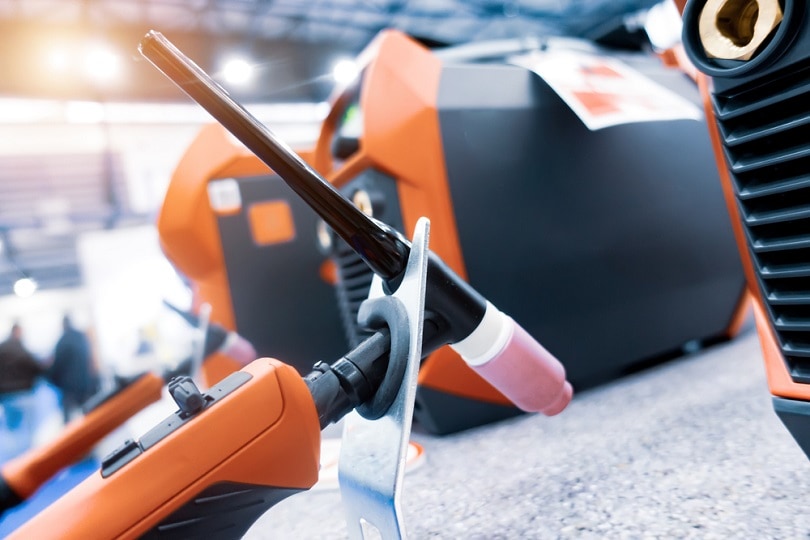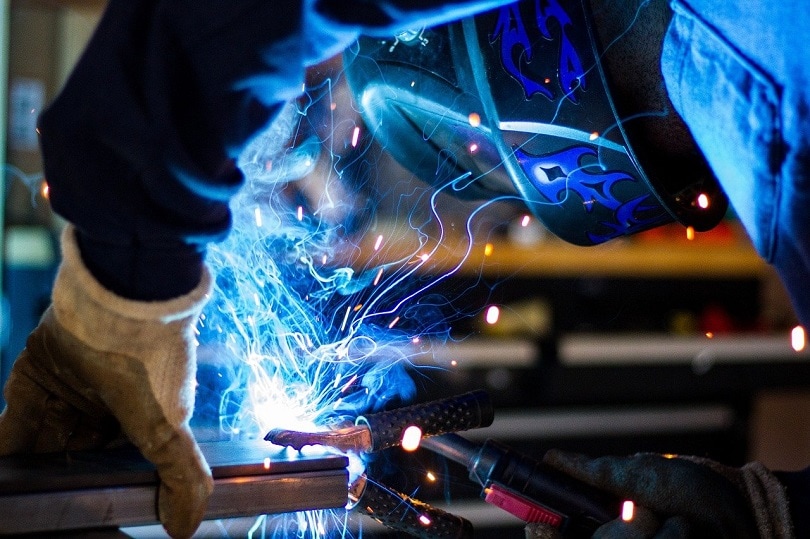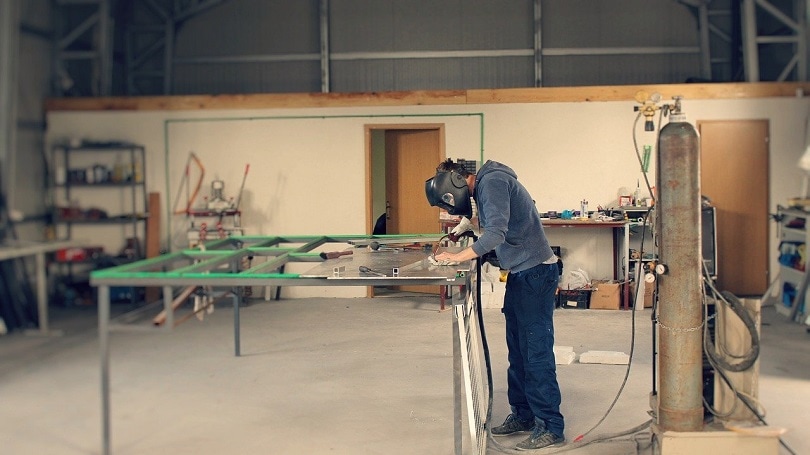AC vs DC Welding: What’s the Difference?
Last Updated on

When you’re learning to weld, the sheer amount of information you need to know can be overwhelming. There’s so much terminology to learn and the variables seem infinite. You need to know how to set your equipment for different types of metals, with changes made for variations in thickness, filler material, and the amperage you’re using.
You might have noticed settings on your welder for AC and DC welding, or maybe you’re searching for a first welding machine and can’t decide between models. Is AC or DC superior? Are we talking about a classic rock group?
Well, we’re certainly not discussing a rock band, and neither AC nor DC is necessarily superior. However, they are very different and which one you should choose depends on a variety of factors, which we’re going to discuss in this article to help you understand the differences between AC and DC welding.
Overview of AC Welding:
With AC electricity, electrons switch the direction that they flow, back and forth, 120 times each second. Once you understand this, it makes sense that AC stands for alternating current since the current is always alternating.
In most cases, AC is considered to be inferior for welding, so DC is usually the go-to choice. However, this is not always the case.

When AC Welding is Superior
AC welders tend to be cheaper than DC welders. So, for many new welders just starting out, an AC welding machine is more suitable simply based on price. If an AC welder is all you have available, then it’s obviously your best choice at the time.
AC is also a superior choice when welding magnetic materials. The alternating current allows for a steadier arc on magnetic materials specifically, which can help to reduce the arc blow you’re likely to experience with a DC welder.
You’ll also find that AC welding allows for higher temperatures, making it a better choice when welding aluminum. You can also penetrate plate metals deeper with AC welding, so it’s a great choice when welds need to be deep, such as in shipbuilding.
Drawbacks of AC Welding
Even though AC welding has some advantages, there are many reasons why it’s not the go-to option for most scenarios. The main issue with AC welding is the continuous alternating of the direction of current. When the current changes direction, there’s a brief moment when there’s no amperage. This creates far more fluctuation in the arc of an AC welder, which is why DC welding tends to be easier and allows for cleaner welds.
Additionally, AC welding produces more splatter, which makes it a poor choice for welding vertically or overhead.
- AC machines are usually cheap
- Can fix arc blow issues
- Best for welding aluminum
- Great for welding materials with a magnetized field
- More fluctuation than DC welding
- Welds are usually not as smooth
- There’s more spatter
- An AC arc is harder to work with
Overview of DC Welding:
More commonly used than AC welding, DC welding is considered to be superior in many regards. DC stands for direct current, meaning that the current is only flowing in one direction, and it flows continuously. This is the type of current you’ll find in batteries and low-voltage devices. Even your car utilizes DC electricity.

When DC Welding is Superior
Because DC welding doesn’t have that zero-amperage moment like AC welding, you get a stabler arc overall. This is why DC welding is easier to control and allows you to create cleaner, smoother welds while producing less spatter. Since there’s less splatter and mess, you can use DC welding in places that AC isn’t a great choice, like when welding overhead.
For beginners, DC welding is definitely the better choice. There will be a shorter learning curve, allowing you to produce more attractive welds sooner. But even pros opt for DC welding in most situations.
Drawbacks of DC Welding
Still, there are sometimes when DC welding isn’t the best choice. Because you’re more likely to get arc blow when DC welding, it’s not great for working with magnetic materials.
DC welding doesn’t use the same high temperatures that you’ll use when AC welding, so it’s not a great choice for welding aluminum that needs the high heat for proper weld adherence.
Even though DC is a better choice for beginners, DC welding machines can be prohibitively expensive. This can often steer a beginning welder towards the more affordable AC welding machines, even though they aren’t as great of an option for a beginner from a performance standpoint.
- Produces smoother welds
- Arc is more stable
- Easier to use
- Less spatter
- Can cause arc blow
- DC welders tend to be more expensive
- Not a good choice for welding aluminum
Is AC or DC Welding Superior?
In an ideal world, we could give you a definitive answer about which type of welding is superior. Then, you’d only need to get one type of welding machine, learn one method of welding, and never worry about it again. Of course, this is unrealistic, and the truth generally lives in a gray zone rather than black and white.
So, which type of welding should you use? The truth is, it depends on your situation. Each type of welding is the better choice in some scenarios.
Beginners
For beginners, DC welding is much easier to work with and allows for cleaner welds. On the other hand, DV welding machines tend to be more expensive than their AC counterparts, which might push beginners towards AC welding simply because it allows for a more affordable entry into welding.
Welding Aluminum
When you’re welding aluminum, AC welding is the better bet. AC welding reaches much higher temperatures, which is necessary when you’re working with aluminum. DC welders don’t reach the same temperatures, making them a poor choice for welding aluminum.
Welding Thin Metals
Because of the lower temperatures that DC welding takes place at, you can use it with much thinner metals without punching a hole through your material.
Deeper Penetration
On the flipside, AC welding is much better when dealing with thick plate metals that require deep penetration for the welds to offer a firm hold.
Overhead or Vertical Welding
DC welding produces far less splatter and mess. When you’re welding above your head, the last thing you want is molten spatter dripping on your dome. Naturally, DC welding is the better choice in such circumstances.
Magnetized Materials
If you’re trying to weld magnetized materials, you’ll want to go with AC since it doesn’t have the same issues with arc blow that you’re likely to have when trying to weld magnetic materials with a DC welder.
- You need the smoothest weld possible
- You can afford the welder you want
- When welding thin metals
- You’re inexperienced at welding
- When doing overhead or vertical welding
- Weld appearance isn’t as important
- You’re on a limited budget
- You need deep penetration of plate metals
- Welding metals with a magnetized field
- Whenever you’re welding aluminum
Final Thoughts
When comparing AC (Alternating Current) and DC (Direct Current) welding, there is no definitive answer as to which is better. Each has its strengths and weaknesses. Because of this, each type of welding is a superior option in certain circumstances. If possible, you’d be best served by having a welder that can do both. But if you could only get one, then DC is probably a better bet. It works on a wide range of materials offering a smooth weld with minimal splatter that’s easier to use. Just keep in mind that DC welders tend to be more expensive than AC models.
Featured image credit: Dizfoto, Shutterstock
